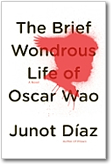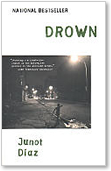Junot Diaz
posted Jan 15, 2008
Junot Díaz is in a hurry. And it’s not hard to see why. We can’t think of a writer who’s busier, between teaching and public appearances coming out the wazoo. Yet he recently sent a failbetter.com world record, by responding to our interview questions inside an evening’s time.
We're grateful to him for that, but we know what you're wondering... Is all this "non-fiction" activity the reason he took so long to finish his second book?
Not at all: Díaz works harder at his writing than anything else, and is his own toughest critic. Which explains why The Brief Wondrous Life of Oscar Wao was eleven years in the making. And also why, for our money, it's as good or better than his amazing debut, Drown—and indeed, why it’s one of the best books of the new century.
| * * |
Oscar contains an enormous trove of information about Dominican culture and history, giving non-Dominican readers a fascinating insight into the way your characters see themselves, their relationships to one another, and their place in the world. And you present a fair amount of this stuff in footnotes—did you use them because there was just too much to work into the text? And in including it, did you see your mission as not just literary, but educational?
All books train a reader, program them, you could say. I was interested in programming my reader with a specific awareness not to Dominican history but to history. How it hems us in, how it shadows us as we walk, how much there is of it. I’m not so bad a writer that I couldn’t have massaged that shit into the primary text but I had something else in mind with the footnotes. I was trying to construct a counter-narrative to the primary text, trying to disrupt the dictatorial control the main text has an on reader. If the main text, the main story is the US, the footnotes are Santo Domingo in more ways than one.
You've said that in Oscar's wake, you've set to work on a novel you’d started and put aside in the wake of the September 11 attacks, about a terrorist who destroys New York. Such a project would seem to be a particular challenge—for you, does that make it too compelling to pass up?
I’m obsessed with the apocalyptic. My basic narrative, epistemic engine is the eschaton. It’s not the destruction of NYC by a psychic terrorist that drives me, per se. It’s how we cope with the apocalypse, how we survive it and then forget that pulls me.
Your work is filled with evidence of your childhood love of science fiction—do you still read sci-fi today? And do you ever think about tackling a "pure" sci-fi work?
I started reading scifi again to write this book. Tons of old and new stuff. I still read it now—it was one of the gifts that Oscar gave me. I think about writing all kinds of books all the time but I write so slow that I’m basically stuck thinking about it and nothing else. The End of New York book would have been scifi so there you go.
You’ve said that if you could have afforded to take up film at a young age, that might have been your medium of choice. Other writers, ranging from Paul Auster to Alberto Fuguet, have tried their hands behind the camera—are you tempted to follow their lead? And will you be involved in the forthcoming Scott Rudin production of Oscar Wao?
I can barely write; I’m not going to get involved in any other medium and I won’t be involved. I really don’t need any excuses to avoid the work on the page and diving into a film sounds like a great way to be avertive.
You struggled for some time to establish yourself as a writer, before Story published your first piece. Did you toss out the stories you'd sent out at the start of your career, or continue to rework them until they were good enough to publish? And in general, do you ever abandon a project permanently, or do you always come back to everything you’ve started, once you have an inspiration for how to make it better?
Oh my God—my graveyard of dead stories extends for miles. I’m the great destroyer of my own talent. Ruthless, implacable, cruel. I rarely come back to anything, which says a lot about how fucked up I am.
You've said that in the wake of Drown’s success, you put a tremendous amount of pressure on yourself, and only managed to produce Oscar Wao after you had an "I-don't-care" revelation, and could write without worrying what anyone would think of your work. Did this feeling carry you through the whole novel, or just enable you to get far enough along that you felt confident it would "work"?
Eleven years is a long long time. Once I stopped caring, once I found the silence in my self again it propelled me through the whole book. I’m telling you, as an artist, try waiting five years before you make another piece of work—see what that does to you. Then wait seven. Check your heart then. By the seventh year I was alone and completely in silence and it was only then, in that space, that I could touch my work again.
Have you found other ways to deal with this pressure, on a day-to-day basis? And do you still feel as much of it, even in the wake of both your books’ success?
I’m not the writer all my writer friends are. They write fluidly and easy and the produce endlessly. I’m probably going to write a book a decade, if I’m lucky.
You’ve been quoted as saying that your greatest failing is that you don’t write enough, so we imagine you're not the sort who starts and stops work every day at the same time, always generating the same number of words as the day before. But do you follow any sort of writing routine, or work only when you're inspired?
Oh, mein Gott: you got it all wrong: I write every day for a set number of hours. And I STILL only manage to generate what I generate. If I didn’t have that discipline, that drive, I wouldn’t get nothing fucking done. I’m just one of those cats who writers a hundred pages to find five that are worth anything. A low rate of exchange but as a third world kid I’m used to such injustices.
A followup to the previous question: Where do you usually find inspiration—from thinking about your characters and the situations you’re writing about, from others’ work, or from some other source? And when you’re looking to jumpstart your imagination, how do you do it?
Hard to say. So many months of silence, of failing, something eventually reaches out of the middens, a bit of light, a whisper, a face. I don’t draw from my life around me much. There seems to be a ten year moratorium on my life before I can write about it. It really is a confounding thing. I have talent, I know I do, it just never comes easy.
When you were teaching at Syracuse, you said you preferred working with undergrads rather than grad students, because undergrads tend not to take a careerist approach to their writing, and so take greater risks. Have you found ways to get MFA students to do the same? And do you think the careerist focus of so many MFA programs is a reason for young writers to avoid them, and find another way to hone their skills?
I think MFA programs create as many good writers as other approaches. There’s external non-helpful pressures and temptations everywhere and we should not forget: not every program has the same texture or atmosphere. (Some programs after all give all their students a free ride, others make them scrap over limited funding.) Also a program’s vibe can change radically from year to year. So it’s hard to generalize: you never know when you’re going to get a great class and when you’re going to get a class of competitive trifling motherfuckers and sometimes it turns out to be the same damn thing. I haven’t worked at an MFA level since I left Syracuse so I can’t really speak to making MFA students resist the careerist shit that drove me nuts the first time around. In general I think MFA programs should give out writers-at-large grants to support non-traditional writers who can’t or don’t wish to work inside of the traditional MFA structure. That would be cool and allow for a lot more range and variety.
You’ve been quoted as saying that the reason you became a writer was that you’ve always been an obsessive reader, with influences ranging from Toni Morrison to Los Bros Hernandez. Among emerging writers, in both English and Spanish, whose work most inspires you now?
Well, Gilbero Hernandez still knocks me clean for a loop. Edwidge Danticat is both a friend and a great source of inspiration. I love Upamanyu Chatterjee and KJ Bishop and Shaun Tan and Chris Abani. So many others that I’m forgetting. I can’t stop reading; it’s my constant companion, my quiet joy.
© 2007 failbetter LLC · all rights reserved









